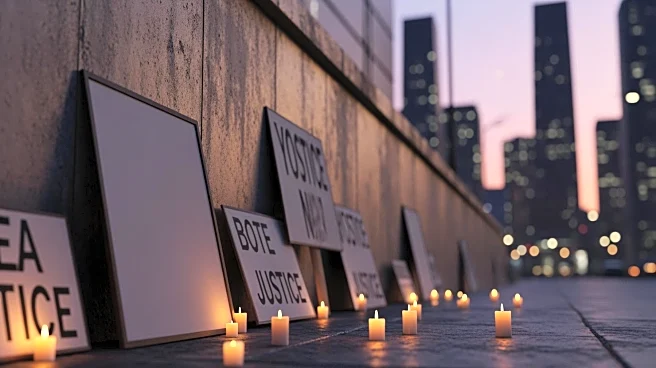What's Happening?
Thousands of protesters, identifying as 'Generation Z,' have taken to the streets across Mexico following the assassination of Uruapan Mayor Carlos Manzo. The protests, which occurred in multiple states including Michoacan, were sparked by Manzo's public
killing at a Day of the Dead event on November 1. In Mexico City, tensions escalated as demonstrators clashed with police near the National Palace, resulting in injuries to 100 officers and 20 civilians. Authorities detained 20 individuals and cited another 20 for administrative violations. The movement, led by a group called 'Generation Z Mexico,' claims to be non-partisan and aims to address violence and improve public safety.
Why It's Important?
The protests highlight the growing influence of Generation Z in political activism, reflecting a global trend where young people are increasingly vocal about social and political issues. The unrest in Mexico underscores the public's frustration with government efforts to combat violence and corruption, particularly in regions plagued by cartel activity. The mobilization of youth could pressure the government to implement more effective policies to ensure public safety and address systemic issues. The involvement of young people in such movements may also signal a shift in political engagement and priorities in Mexico.
What's Next?
The Mexican government faces the challenge of addressing the concerns raised by the protests while maintaining public order. President Claudia Sheinbaum has called for peaceful demonstrations, emphasizing the importance of non-violence in public gatherings. Authorities may need to investigate the origins of the protests, as officials suspect political opponents may have influenced the rallies. The government might also consider revising its strategies to combat cartel violence and improve public safety, potentially leading to policy changes or increased security measures.
Beyond the Headlines
The protests in Mexico are part of a broader pattern of youth-led movements worldwide, as seen in recent demonstrations in Nepal. The rise of Generation Z as a political force could lead to long-term shifts in how governments address youth concerns, potentially influencing policy decisions and political discourse. The movement's emphasis on non-partisanship and public safety may inspire similar initiatives in other countries, fostering a global network of young activists advocating for change.















